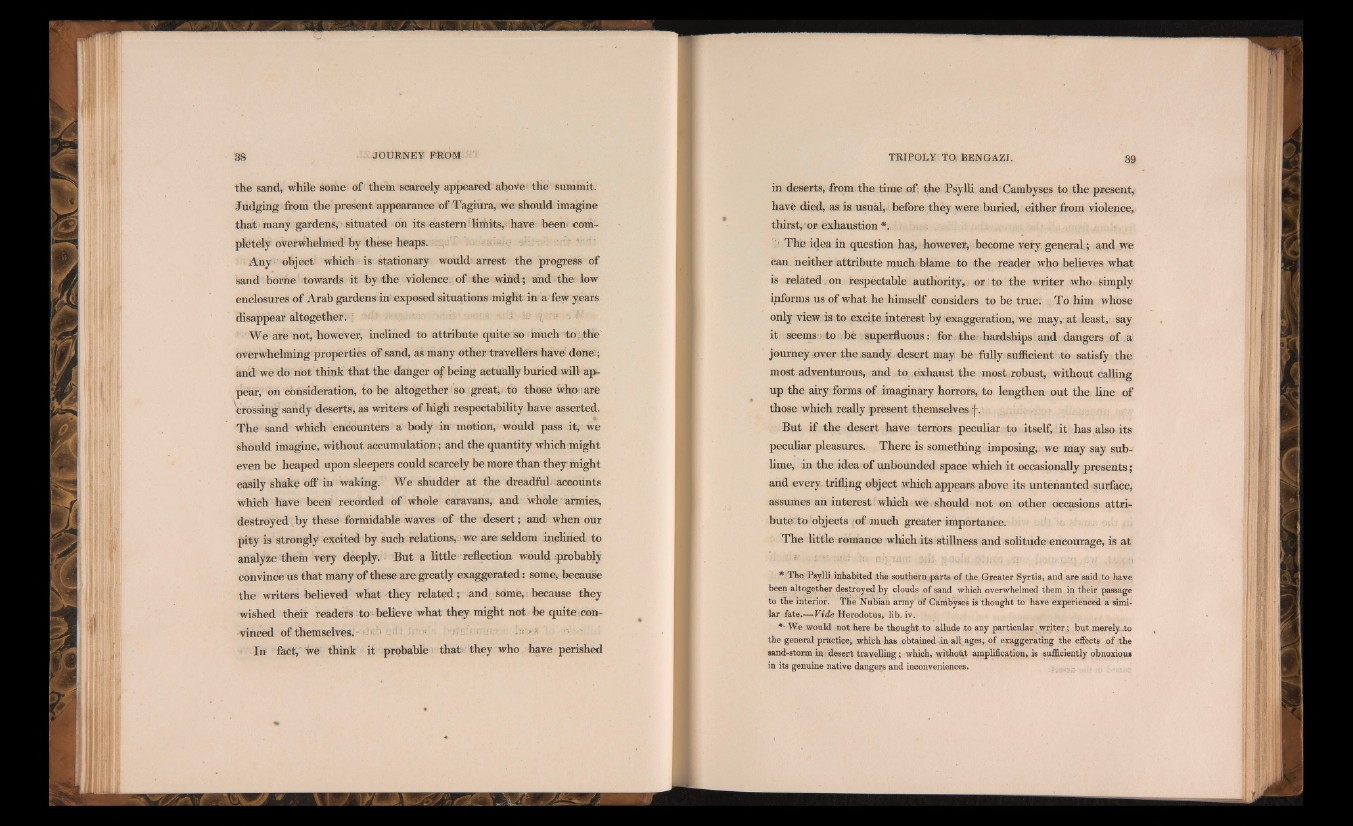
the sand, while some of them scarcely appeared above< the summit.
Judging from the present appearance of Tagiura, we should imagine
that many gardens, • situated on its eastern: limits,* hasre been* completely
overwhelmed by these heaps.
Any object which ■ is stationary would* arrest the progress of
sand borne towards it by the violence of the wind; and the low
enclosures of Arab gardens in exposed situations might in a-few years
disappear altogether.
We are not, however, inclined to attribute quite so hmch"to;.thse
overwhelming properties of sand, as many other travellers have done*;
and we do not think that the danger of being actually buried will appear,
on consideration, to be altogether'so great; to those who :are
crossing sandy deserts, as writers of high respectability have asserted.
The sand which encounters a body in motion, would pass it, we
should imagine, without accumulation ; and the quantity which might
even be heaped upon sleepers could scarcely be more than they; might
easily shake off in waking. We shudder at the dreadful accounts
which have been recorded of whole caravans, and whole' armies,
destroyed by these formidable waves of the ¡desert; and* when our
pity is strongly excited by such relations,, we are seldom inclined to
analyze them very deeply, But a little reflection would ¡probably
convince us that many of these are greatly exaggerated: some* because
the writers believed what they related; and Some,; because they
wished their readers to believe what theymight not be quite ¡convinced
of themselves.- deb *
In fact," we think it probable* thab they who have perished
in deserts, from the time of: the Esylli and Cambyses to the present,*
have died, as is .usual,• before they were buried, either from violence,
thirst, for- exhaustion *.
Si The idea in question has,-however, -become very, general; and we
can neither attribute much blame to the reader who believes what
is related, on respectable authority,: or to the writer who ¡simply
informs us of what he himself considers to be true; To him whose
only view is to excite interest by exaggeration, we may, at least, say
it seems : to bé superfluous : for the; hardships and dangers of a
journey over the ¡sandy desert may. be fully sufficient ,to satisfy the
most adventurous, and to exhaust the most robust, without calling
up the airy forms of imaginary horrors, to lengthen out the line of
those which really present themselves f .
But if the desert have terrors peculiar to itself, it has also its
peculiar pleasures. There is something imposing, we may say sublime,
in the idea of unbounded space which it occasionally presents;
and every, trifling object which appears above its untenanted surface,
assumes an interest which we should not on other occasions attribute:
to objects ¡of much greater importance.
The little romance which its stillness and solitude encourage, is at
* The' Psylli inhabited .the southern .parte of the Greater Syrtis, and are said to have
been altogether destroyed by clouds of sand which overwhelmed them in their passage
to the interior. Thé Nubian army of Cambyses is thought to hare experienced a similar
fate.—.Fide Herodotus, lib. iv.
*- We would not here be thought to allude to any parthiular. writer ; butjmerely_to
the general practice,, which, has obtained in. all ages; of exaggerating the effects of the
sand-storm in desert travelling ; which, without amplification, is sufficiently obnoxious
in its genuine native dangers and inconveniences.